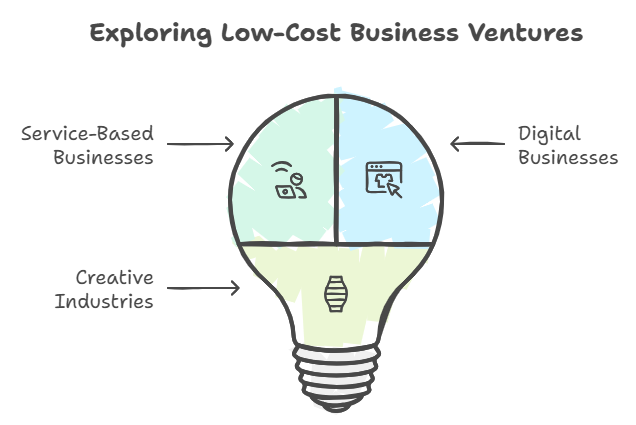 Starting your own business doesn’t have to be expensive. Many low-cost business ideas offer opportunities to create something impactful without a large budget. These ideas often focus on using your existing skills or leveraging affordable technology. By starting small, you can reduce risks and test your concepts before committing more resources.
Starting your own business doesn’t have to be expensive. Many low-cost business ideas offer opportunities to create something impactful without a large budget. These ideas often focus on using your existing skills or leveraging affordable technology. By starting small, you can reduce risks and test your concepts before committing more resources.
Low-cost businesses are appealing because they allow flexibility and scalability. With careful planning, you can turn a small investment into a sustainable venture. Whether it’s providing services, selling products online, or using digital platforms, there are many ways to succeed without overspending.
Exploring low-cost business ideas gives you the chance to build a business on your terms. By taking thoughtful steps and focusing on growth, you can create a path to financial independence and long-term success.
Defining Low-Cost Business Ventures
A low-cost business is one that requires minimal financial investment to start and operate. These ventures are ideal for entrepreneurs with limited resources or those testing an idea before scaling. Common examples include freelance services, online consulting, or dropshipping businesses. The key is to focus on ideas that use your existing skills and tools, reducing the need for significant upfront spending.
Low-cost business ideas often leverage technology and digital platforms to reach customers without the expense of physical locations. For instance, selling products online avoids high rent costs associated with retail spaces. Similarly, offering virtual services lets you save on commuting and office expenses. These businesses are flexible, allowing you to work from home and control your hours.
Starting a low-cost business reduces financial risk, making it a great choice for first-time entrepreneurs. By minimizing expenses, you can focus on building a customer base and refining your offerings. This approach also allows you to reinvest profits into growth without heavy reliance on loans or investors. With the right strategy, your small investment can lead to sustainable success.
Top Low-Cost Business Ideas by Industry
Low-cost business ideas are plentiful across various industries, offering opportunities for creativity and flexibility. Service-based businesses often stand out for their minimal startup costs. For example, tutoring, pet sitting, or virtual assistance rely on skills you already have. These businesses can be run from home, keeping overhead expenses low. With clear communication and consistent effort, you can build a reliable client base.
Digital businesses are another great option for low-cost ventures. Selling products through e-commerce platforms or offering freelance services like graphic design and writing are affordable to start. Many tools for marketing and communication are free or inexpensive, making it easier to reach potential customers. These businesses are also scalable, allowing you to expand gradually as demand grows.
Creative industries also provide opportunities for low-cost business ideas. Crafting handmade goods, teaching art classes, or offering photography services can be started with basic equipment. Many people value unique, personalized products or experiences, which can help you stand out in these markets. Building an online presence through social media can further boost visibility without requiring a large budget.
Exploring affordable opportunities within these industries allows you to start small and grow at your own pace. By focusing on your skills and customer needs, you can create a business that aligns with your goals. This thoughtful approach helps you succeed without overspending.
Key Considerations Before Starting a Low-Cost Business
Before starting a low-cost business, it is important to evaluate your personal skills and strengths. Consider what you already do well and how these skills can support your business. Your abilities often determine the type of work you can manage without needing costly training or additional help. Matching your skills to your business idea can also boost confidence and efficiency.
Understanding market demand is equally important when exploring low-cost business ideas. Research your target audience to determine if they need or want your products or services. Look for areas with limited competition or underserved markets. This insight can help you design offerings that appeal directly to potential customers and improve your chances of success.
You should also think about potential challenges that may arise during the startup phase. For instance, some low-cost businesses may require a significant time commitment to generate income. Others may involve unpredictable cash flow or a steep learning curve. By identifying these challenges early, you can plan how to handle them and avoid unnecessary setbacks.
Balancing your skills, understanding market demand, and preparing for obstacles can set the foundation for a strong business. This thoughtful approach allows you to choose the right low-cost business idea and move forward with clarity. By addressing these factors, you improve your chances of creating a sustainable and rewarding venture.
Leveraging Technology to Minimize Costs
Leveraging technology can significantly reduce costs and streamline operations for your business. Online tools and platforms simplify tasks like bookkeeping, scheduling, and communication. Many of these tools are free or offer affordable subscription options, making them ideal for businesses with limited budgets. By automating repetitive tasks, you can save time and focus on growing your business.
Digital marketing is another powerful way to minimize expenses while reaching a broader audience. Social media platforms, email campaigns, and search engine optimization are cost-effective strategies to promote your services or products. These tools allow you to connect directly with your target audience without investing heavily in traditional advertising. Consistent and engaging online content can help build trust and attract customers.
For low-cost business ideas, technology also enables you to operate virtually, reducing overhead costs like office space or retail rentals. Platforms for virtual meetings, file sharing, and e-commerce provide all the tools you need to serve customers online. These resources not only lower initial costs but also make it easier to scale your business as demand increases.
By integrating technology into your operations, you can improve efficiency and maintain a competitive edge. A smart use of digital tools allows you to focus on delivering value while keeping expenses manageable. This approach helps you build a sustainable business without exceeding your budget.
Success Stories of Low-Cost Startups
Many successful businesses started as low-cost business ideas, proving that innovation and dedication matter more than large investments. One example is Spanx, founded by Sara Blakely with just $5,000 in savings. She created a revolutionary product by identifying a common need and used direct connections with retailers to launch her brand. Her story shows how focusing on a niche market can lead to exponential growth.
Another well-known example is Apple, which began in a garage with limited resources. Steve Jobs and Steve Wozniak combined their skills to create a product that met the growing demand for personal computers. They leveraged their technical expertise and strategic partnerships to scale their business from humble beginnings to a global powerhouse.
Closer to the present, many digital entrepreneurs have built thriving businesses with minimal investment. For instance, Dropshipping businesses have grown rapidly due to low startup costs and the ability to operate online. Entrepreneurs in this field often begin by identifying trending products and marketing them effectively through social media platforms.
These stories highlight how low-cost business ideas can succeed with creativity, persistence, and smart planning. While starting small, these entrepreneurs capitalized on opportunities and reinvested in their ventures. By focusing on delivering value, you can build a sustainable business, regardless of your initial budget.
Tips for Scaling Your Low-Cost Business
Scaling your low-cost business requires careful planning and a focus on sustainable growth. Reinvesting profits is one of the best ways to expand. Use early earnings to improve your offerings, enhance marketing efforts, or purchase better tools. These small investments can increase your reach and build credibility over time.
Automation is another effective strategy for growth. By automating routine tasks like invoicing or social media scheduling, you free up time for bigger priorities. Affordable tools and platforms can handle repetitive work, letting you focus on growing your customer base. Automation also helps maintain consistency, which is essential as your business grows.
Expanding your customer base is key to scaling low-cost business ideas. Engaging with your audience through social media, email, and online reviews helps build trust and attract referrals. Offering excellent customer service can turn one-time buyers into loyal customers. Happy customers often recommend businesses to others, creating organic growth.
Scaling a business takes time, but consistent effort and smart decisions can lead to significant results. By reinvesting wisely, automating where possible, and connecting with your audience, you set the stage for sustainable expansion. These steps help you grow without overextending resources, keeping your business strong as it evolves.
Conclusion
Low-cost business ideas provide accessible paths to entrepreneurship, helping you start small and build something meaningful. These ventures require creativity, effort, and smart planning. By focusing on your skills, market demand, and leveraging affordable tools, you can create a sustainable business.
Technology offers countless ways to reduce costs and expand your reach. Reinvesting profits and also automating processes allow you to grow efficiently. Strong customer relationships will also help you build loyalty and attract referrals, fueling your business’s success.
Starting with low-cost business ideas gives you the chance to explore opportunities without significant financial risks. With dedication as well as thoughtful strategies, you can create a business that aligns with your goals and grows over time.



